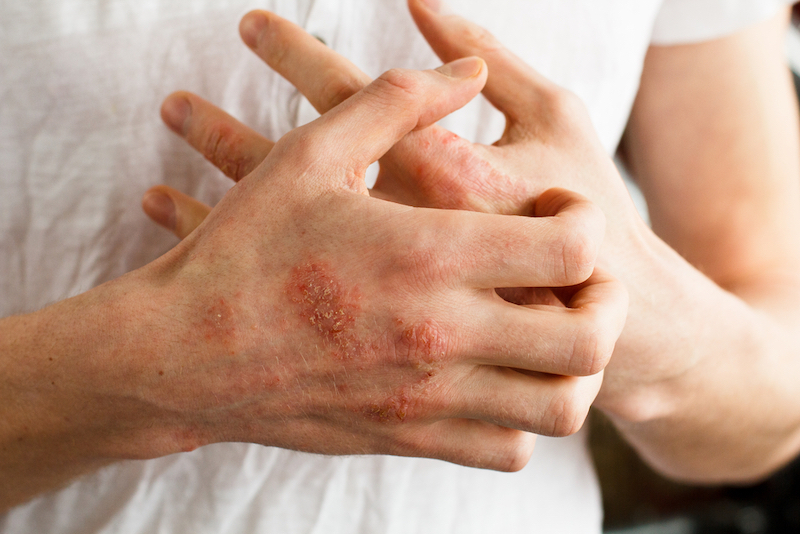Contents:
Why do you get eczema more often in the summer? Causes and solutions
Have you ever noticed that your eczema gets worse in the summer? You are not alone. Many people experience a worsening of their eczema symptoms during the warmer months of the year. This can happen for several reasons, including the heat and humidity of summer, as well as exposure to certain allergens and irritants.
One of the main reasons why eczema often gets worse in the summer is high humidity. When it is damp, your skin can remove less moisture, increasing the risk of dryness and irritation.
This can lead to a worsening of eczema symptoms such as itching, redness and inflammation. Additionally, sweat can also contribute to eczema symptoms as it can irritate and dry out the skin.
Another factor that contributes to eczema symptoms in the summer is exposure to allergens and irritants. This includes pollen, grass, insect bites and sunscreen.
If you are allergic to these substances, exposure to them can lead to a worsening of eczema symptoms. It’s important to know which substances make your eczema worse so you can avoid them and manage your symptoms.

Skin hydration
Dry skin can make eczema worse. Therefore, make sure your skin stays well hydrated. Use a moisturizer that is specifically designed for sensitive skin and is free of perfume and other irritants. Apply the cream after showering and bathing and repeat several times a day. Also avoid using soaps and shower and bath products with harsh chemicals.
By following these tips you can prevent and reduce eczema in the summer. However, remain cautious and consult a doctor if your eczema persists or worsens.
How to treat eczema
If you suffer from eczema in the summer, there are several treatments available to reduce the symptoms. Here are some options:
Topical creams and ointments
Topical creams and ointments are the most common treatments for eczema. These products are applied directly to the skin and can help reduce redness, itching and inflammation. Several types of topical creams and ointments are available, including corticosteroids, calcineurin inhibitors, and pimecrolimus.
Light therapy
Light therapy, also known as phototherapy, is a treatment that uses UV light to reduce the symptoms of eczema. This treatment is usually performed in a clinic or hospital and can help reduce inflammation and itching.
Oral medication
If other treatments are not effective, your doctor may prescribe oral medications to reduce the symptoms of eczema. This medication may contain corticosteroids, antihistamines, or immunosuppressants.
It is important to talk to your doctor before starting treatment for eczema. Your doctor can determine which treatment is most appropriate for your specific symptoms and medical history.
When to consult a dermatologist
If you suffer from eczema, it can sometimes be difficult to determine when it is time to consult a dermatologist. Here are some situations in which it is wise to visit a dermatologist:
- If your eczema does not respond to usual treatments, such as creams and ointments.
- If your eczema spreads to other parts of your body.
- If your eczema is accompanied by other symptoms, such as fever, pain or swelling.
- If your eczema interferes with your daily activities, such as work or sleep.
A dermatologist can help you determine the cause of your eczema and create a treatment plan specific to your needs. It is important to remember that eczema is a chronic condition and it will not go away on its own. A dermatologist can help you manage your eczema and reduce your symptoms.
When looking for a dermatologist, ask for recommendations from friends and family members. You can also search for dermatologists in your area on the Internet. Make sure you choose a dermatologist who has experience treating eczema and who makes you feel comfortable during your appointment.
Remember that it is important to take your eczema seriously and to seek help when needed. With proper treatment and care, you can reduce your symptoms and have a better quality of life.
Many people suffer from eczema in the summer. This can have various causes, such as heat, sun, sweating and the use of certain products. It is important to take good care of your skin and use the right products to prevent or reduce eczema.
Good skin care starts with using mild, moisturizing products that do not contain irritants. In addition, it is important to protect your skin well against the sun and not to stay in the sun for too long. Avoiding excessive sweating and wearing light clothing can also help prevent eczema.
If you do develop eczema, it is important to act quickly and use the right treatment. This may include applying a cream or ointment, avoiding irritants and reducing sun exposure.
In short, by taking good care of your skin and using the right products, you can prevent or reduce eczema in the summer. If in doubt, always consult a doctor or dermatologist for tailor-made advice.

